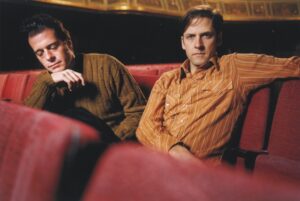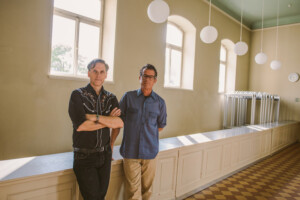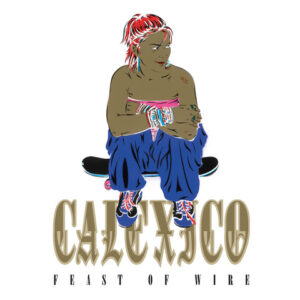CALEXICO ANNOUNCE ‘FEAST OF WIRE’: 20TH ANNIVERSARY DELUXE EDITION + TOUR DATES
March 15, 2023
Calexico announce Feast of Wire 20th Anniversary Deluxe Edition available May 26th via City Slang and Quarterstick Records
Original album remastered as 2xLP at 45 RPM • Now with Bonus Track “Alone Again Or”
Includes additional 10-track live album‚ More Cowboys in Sweden: Live at China Theatre in Stockholm, 2003
Share version of “Black Heart (Live at China Theatre Stockholm)”
Announce Fall tour dates in Europe and the UK

Reflecting back on the making of Feast of Wire, Joey says, “I’m reminded of how much time and space we had in the studio to try out all sorts of ideas. Most of the recordings started like they often do with John on drums and myself on guitar. And as we brought in the other band members it was like a river was flooding through our subconsciousness and we couldn’t get the ideas to analog tape fast enough.“
The band is set to tour Europe this year, and today are announcing an additional string of dates this fall. In honor of the anniversary, the shows will feature Feast of Wire played in its entirety, plus many fan favorites to close out each evening. The fall tour dates (listed at bottom) will begin to go on sale this Friday, March 17, at 10am GMT / 11am CET at casadecalexico.com.
Before mid-February 2003, when Calexico released their fourth album, Feast of Wire, it was tough to know where the band fit in. Since their 1996 debut, Spoke, the Tucson, Arizona-based core duo had devised a distinctive musical mélange, with 1998’s The Black Light and 2000’s Hot Rail blending country with cinema noir, jazz with desert rock, and French chanson with Latin rhythms. These LPs built on a freedom Joey Burns and John Convertino had also exercised until recently as part of Giant Sand; that they’d collaborated with an unusually wide variety of other artists, including Neko Case, Buffalo Tom’s Bill Janowitz, The Lemonheads’ Evan Dando and, soon, Nancy Sinatra – as well as remixing both Goldfrapp and Andrew Weatherall’s electronic project Two Lone Swordsmen – only made it harder to figure out where they belonged.
Sure, when it came to defining their sound – with their influences encompassing the likes of Morricone, Mingus, The Minutemen and El Mariachi Vargas de Tecalitlán, as well as Tom Waits and Elvin Jones – one could submit lazy clichés, and plenty were provoked by their idiosyncratic angle on what was by now known diversely as Americana, Alt. Country and New Country. Britain’s Melody Maker had managed to pack in a few during their review of Feast of Wire’s predecessor: “Whether you’re downing tequila shots with only a worm and Jose the bartender to keep you company, or supping on a Red Bull and vodka in your local, Hot Rail is made for everyone who’s ever come second in any of life’s duels.” If one dug deeper, however, beyond the extravagant flourishes, one could see things were more complicated, a fact illustrated by the UK’s Mojo, who described the record as “innovative and ambitious: one minute Smog in a Spaghetti Western, the next Peckinpah meets Pink Floyd, or Palace playing Radiohead, or Lou Reed in a mariachi band.”
Whatever people’s take on Calexico’s mercurial, melodious fusion, it was generally agreed that it was as effective as it was imaginative and as appealing as it was invigorating, with Hot Rail selling over 100,000 copies in Europe alone. It was frequently celebratory, too, though this wasn’t always overt in the dusty environs of their albums. Hot Rail, for instance, had swung from “El Picador”, its opening fiesta, into “Ballad Of Cable Hogue”, a Nancy & Lee styled duet, moving on to the brooding “Fade”s brassy drama before concluding with the title track’s parched, Ry Cooder-like strains. Their music’s jubilant nature, however, was more apparent to their swiftly growing live audiences. The band particularly wowed crowds when their American songcraft was illuminated by the strings and horns of Mariachi Luz De Luna, a sombrero-touting Tucson outfit whose Jacob Valenzuela was now a full-time touring member of Calexico and whose Fernando Valencia, like Valenzuela, appears on Feast of Wire. It was clear, in other words, that their clash of styles was constructive and enriching, so when it came to attempts to identify them, perhaps the best suggestion was American magazine Magnet’s: “Seek not to label but to listen.”
Given Feast of Wire’s central focus, this was apt advice. Illegal immigration was a hot topic at the turn of the century, just as it remains today: the US was only a few years away from reaching 2007’s peak population of 12.2 million undocumented migrants – i.e. 4% of the country’s population – and by 2003 that number was already approaching 8 million, with the vast majority from Mexico. It was a theme they’d touched on before: Spoke’s cover depicted seasonal workers; the likes of The Black Light’s “Missing” and “Trigger” had invited compassion for the battles of those who sought to settle in America; and Hot Rail had been followed by a riotous single, “The Crystal Frontier”, during which “Ramón tightens up his leather belt and slips through a hole in the fence”. Indeed, straddling divides was in the very DNA of the band’s name, one upon which they’d settled after spotting a sign to a small city on the American border with Mexico. (Mexicali’s just the other side.) Feast of Wire, however, put people like Ramón front and center.
This objective is transparent right away: “Washed my face in the rivers of empire,” Burns sings at the start of “Sunken Waltz’’, “Made my bed from a cardboard crate.” The lines could speak to the song as much as its characters, whether they’re homeless “down in the city of quartz” (Los Angeles) like the protagonist in the first verse, or sleeping beneath the stars, like the second verse’s Carpenter Mike, who dropped tools and “headed out as far as he could”. With acoustic guitar, accordion and a polka metre, it accentuates the link between Mexico’s música norteña and the arrival of German immigrants in southern Texas in the mid 1800s, and thus the music’s liminal state. But if Calexico somehow stood both sides of the fence, they headlined London’s Barbican as part of Beyond Nashville a few months before Feast of Wire’s release – the show, part of a series representing “the twisted heart of country music,” was later released as a DVD, World Drifts In – and they’d be top of the bill at the Royal Festival Hall in 2004 for La Linea, London’s Latin Music Festival. Those who crept north across the physical southern border, on the other hand, received welcomes considerably less forthcoming, their status more precarious and usually more dangerous too.
Feast of Wire is awash in such stories of the dispossessed. The dreamy “Quattro (World Drifts In)” focusses on the marginalized to whom “the world’s a stranger,” concluding ominously, “You have to hit the ground running,” and if it seems enigmatic why, such dread germinates in the epic “Black Heart’’s grittier detail: “Trip on fence post line, sifting through the remains / One man’s close pursuit is another man’s last chance”. Amid the spaghetti western strains of “Close Behind”, Burns gets right to the nub of the matter with the heart-wrenching tale of Marie, a mother who loses her child to a patrol during an illegal crossing – “Sniper surveys the scene / Angel chorus won’t intervene” – while, despite its cheery, mariachi tones, the accordion-fueled “Across The Wire” tells how Alberto and his brother alight on “a whole lake of sleeping children” before we leave them “dodging the border patrol / Out in the wastelands, wandering for days.” On “Woven Birds”, moreover, we turn to the places such individuals have left behind – “The plaza in the village where mission bells used to ring / Is now crumbled to a pile of stench and ruin” – while the album finishes with “No Doze”’s distinctly grim warning: “No angels dear / Will find us here.”
Feast of Wire presents an unusually intimate portrait of the in-betweeners, people caught flailing as they seek to improve their lot. It’s reflected in its songwriting’s pithiness, toned down from the showmanship of Calexico’s performances, and also in its production, with Craig Schumacher, their long- term engineer and now co-producer, capturing their sparse, raw, genre-mashing style in his Wavelab Studios over the course of a year. Formerly an AT&T building – which, given talk of long distances, seems appropriate – the space blesses recordings with the striking acoustics of an empty, isolated mechanic’s workshop on the edge of an empty highway, stressing their arrangements’ sometimes appealingly creaky charms and lending more turbulent moments a visceral drama. Even the most upbeat tune, “Not Even Stevie Nicks…”, depicts a man caught mid-flight between cliff and blue sea, his suicide unstoppable despite the imprecations on a car stereo of Fleetwood Mac’s legendary “priestess, with her wrenches and secret powers.”
Many of the songs from Feast of Wire seek to build a sense of community and dignity, their bleak tales lifted aloft by hook-heavy melodies, blasts of brass, soaring strings, and Convertino’s incomparable drumming. Scattered throughout the record, too, are multiple impressionistic instrumentals, not least “Pepita”, an affecting, hypnotic, pedal steel-drenched instrumental – later used by Adidas’ Impossible Is Nothing commercial with Mohammad Ali – and the haunting “The Book And The Canal”, its crucial piano line recorded on a whim to four track by Convertino in one take: “Then I shut the tape recorder off,” the drummer recalled, “and, you know, walked out of the house”. There’s “Güero Canelo” as well, whose title – translated loosely as ‘Cinnamon Blond’ – is an insult for Mexicans with red hair reclaimed in 1993 by a Mexican restauranteur for his Tucson hot dog stand. The tune quickly became the crowd-pleasing finale of Calexico’s main live set – as heard on this reissue’s accompanying disc, More Cowboys in Sweden – and the band can also be seen performing it in Michael Mann’s Collateral as Jamie Foxx wanders through a packed club. For the ultimate party, though, head for the bonus track, a cover of Love’s classic “Alone Again Or”, recorded with Lambchop’s Mark Nevers for 2004’s Convict Pool EP and always the final encore of Calexico’s shows during the era (as that attendant Scandinavian disc attests).
In hindsight, Feast of Wire represents the climax of what looks much like a trilogy – a truly American Trilogy, one might say – united by a singular production style, Victor Gastelum’s characteristically eye- catching artwork, and the Burns / Convertino chemistry. Boosted by Lambchop’s Paul Niehaus (pedal steel), fellow touring band members Martin Wenk (trumpet, bowed vibes, accordion) and Volker Zander (upright bass) – not to mention, among others, Loose Recordings’ Nick Luka (also second engineer) and the strings of the Tucson Symphony Orchestra – it refines the magic of The Black Light and Hot Rail, and consequently shipped in its first two weeks almost as many in Europe as the latter had sold in its lifetime. It also completed an increasingly focused, lyrical examination of a crucial contemporary topic, one treated with an uncommon sympathy reflected in Burns’ and Convertino’s own willingness – albeit a less perilous one – to risk crossing boundaries like Alberto and his brother. As Burns sings on “Across The Wire”, “You’d think it’d be crazy / To be so far away yet so near.”
Twenty years ago, beneath the shelter of Feast of Wire, Calexico’s empathetic songs found a home. Their human counterparts weren’t – and still aren’t – always so lucky. In the year up to September 2022, U.S. authorities arrested more than 2.3 million people along the southern border on the grounds of illegal immigration, and over 800 died during attempts to cross in the same period. No wonder Feast of Wire still resonates today: it belongs nowhere and everywhere, bidding us, even now, “Seek not to label but to listen…”

